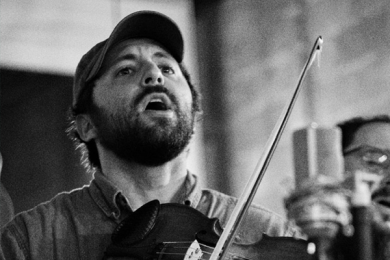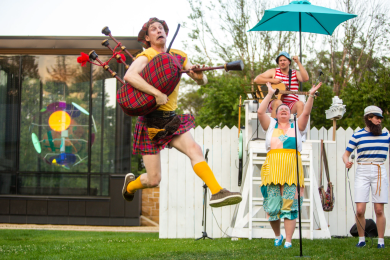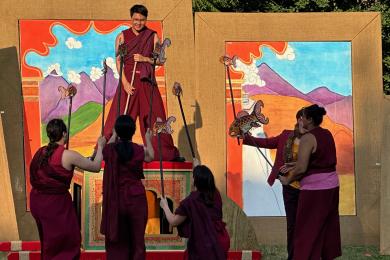What Can Arts Do For Veterans?
News
Today is Veteran's Day. Since I have a grandfather, a brother and multiple friends from my home town who have all served, I mostly want to talk about that, but let's get a few unrelated things out of the way first
Another Quick Note About Money
Last week's News and Notes article was all about money in theatre, and I wanted it to be my last one, but there are a few things that floated by me this week that serve as a nice addendum. A budget breakdown of two runs of the same play in New York spurred last week's delve into finance, and now here's another interesting budget disclosure. ZACH Theatre in Austin, TX recently released a nifty fellowship to help young producers get started in the game.
And, finally, the argument that we will never stop having: "Should arts be publicly funded?". I'm sure we all have our own hard and fast opinions, but Playwright J.T. Rogers and economist Eric Helland have an especially interesting debate that you might want to watch.
This Is What I Think About on Veteran's Day
I do plan on writing more about theatre, but bear with me for a moment; we'll get there.
One day in 2005 I sat in the smoking lounge at the Lambert-St. Louis International Airport with my dad, stepmom and my sisters. In that little smoke-filled fishbowl, we waited anxiously for an airplane to touch down outside. It was carrying my brother on the last leg of his trip back from Iraq.
My brother was a firefighter in the Air Force, stationed at Baghdad International Airport. Whenever he would call us from half way across the world, he would tell us that everything was fine, that it was just boring and hot, that he was just monitoring fire safety equipment, that he wasn't on the front line. He was safe.
It was only after he came home that he told me about the shelling. The insurgent stronghold in Fallujah, 35 miles away, sent out fighters to launch any kind of ordinance they could get their hands on--second and third-hand Russian shells, modern rockets stolen from Iraqi depots, decommissioned stockpiles left over from World War I and II--at their most convenient target: the airport. Until the Marines took down Fallujah at the end of 2004, my brother would see enemy fire at the airport any time between sunset and sunrise. They never knew if what the insurgents were throwing at them would explode or not; or if what they thought were duds would suddenly explode the next day. He'd seen sleeping trailers on the base torn in half by projectiles.
He had trouble sleeping at night, even after he came back. He didn't want to tell us about it while he was still in Iraq. He didn't want us to worry.
It's been eight years since we sat in that smoking lounge, trying not to think about the thousands of ways my brother could somehow still not make it back. He and his wife have a house and two little kids now. I'm going to see them over Thanksgiving, drink some beers, play some cards, listen to endless stories about my niece and nephews, do all the mundane family obligations that people like to complain about after Thanksgiving is over, and I'm going to love it because one errant shell could have erased it years ago.
A few hours ago President Obama finished his Veteran's Day remarks, promising that the longest wars in our country's history are coming to a close. There are already many thousands of veterans returning from the wars in Iraq and Afghanistan, and as we finally extricate ourselves from those wars, there will be many thousands more. This means there are thousands and thousands of stories out there that servicemen and women haven't told you yet. We as a nation and as human beings need to spend some time listening in order to process what we've been doing for the past decade.
This is where theatre can come in handy.
More Than War Stories
A lot of veterans who have been in combat zones don't like to talk about what happened there. It's not always because it was some unspeakable horror. Despite all the war movies, books and video games we consume in this country, most civilians simply lack the background to understand what the people in uniform do and how they might feel about it.
Last week, I highlighted the Veterans Play Project as something that's probably worthwhile to see. The cast features more than a few veterans telling stories gathered from other veterans across the state. Kirsten Stephens, an incredibly talented physical performer who's been working in the Cities for a while, is part of the cast, and she wrote her own article for Minnesota Playlist about the show that you should read right now. Since Kirsten herself is a vet who served in Iraq, her words are especially enlightening.
Kirsten Stephens isn't alone. Quite a few returning veterans go into the arts, and quite a few new organizations have sprung up to help them pursue their passions. Nonprofits like Veteran Artist Program, Veterans in Film and Television and Words After War are all dedicated to helping veterans find their footing in the arts.
Veterans who have successfully transitioned into the arts tend to give back. For example, Adam Driver, the Emmy-nominated actor from Girls (who also happens to be a former Marine) founded Arts in the Armed Forces with his wife while they were still attending Julliard. The organization brings free performances to veterans, active military members and their families.
Not all veterans are artists. Not all of them are going to want you to push their stories into some artistic frame. But they do have stories that are important. Whatever you do for Veteran's Day this year, the best thing you can do is listen.




